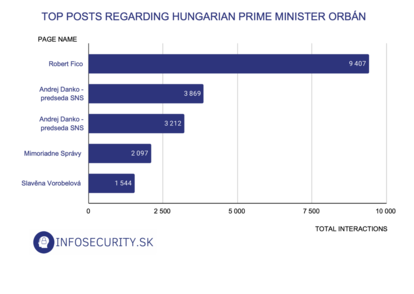Disinformation
Hungarian PM Orbán calls Slovakia a "breakaway territory", and some Slovak politicians strive to defend his claims

Infosecurity.sk presents an overview of disinformation trends that have been on the rise in information space in the past two weeks:
- As elections near, pro-Russian actors in Slovakia oppose military aid to Ukraine, exploiting the issue for political gains by illogically linking it to domestic matters.
- Anti-EU figures spread false information about supposed EU-approved insect consumption in food, fueling distrust and anti-European sentiments.
- Hungarian PM Orbán's claim that Slovakia is a "breakaway territory" of Hungary becomes a talking point among political representatives. Despite historical inaccuracy, some Slovak politicians try to rationalise his statement due to their alignment with Orbán's anti-EU stance.
Military aid to Ukraine is still a prevalent topic
Since the beginning of the Russian aggression in Ukraine and the subsequent global wave of solidarity in support of the country, pro-Russian actors in Slovakia have protested against military aid to Ukraine. They have offered a number of false grounds for their anti-Ukrainian views; ranging from various narratives about prolonging the war to false calls for peace.
However, as the parliamentary elections approach, the same actors are beginning to use the issue to garner public support. They are currently, therefore, trying to convince the population that by helping Ukraine, Slovakia is either losing something or is being forgotten about. Consequently, they often illogically link domestic issues with foreign military aid in an attempt to score political points.
The official Facebook page of SMER-SSD, an anti-system party, wrote in a post: “By arming the Ukrainians, we are sending them to their deaths, and this is what we fundamentally refuse to do as politicians, but mainly as human beings. Our task is not to judge the historical disputes in Ukraine, but to look after Slovakia, because it is bleeding today and no one in power is taking any notice of it.” This rhetoric completely ignores Russia's aggression and the fact that the Ukrainians are forced to defend themselves against it. It is also important to state that countries are not sending the Ukrainians to their deaths by providing them weapons, but by refusing to help them.
In pro-Russian rhetoric, Milan Uhrík, chairman of the far-right Republika party, linked the military aid to Ukraine with the massive closure of public hospitals in Slovakia. On his official Facebook page, he wrote that “Slovakia needs hospitals, not to buy weapons for Zelenskyy”, insinuating that by sending military assistance to Ukraine, Slovakia is losing resources that would otherwise be used in healthcare. However, the underfunded healthcare sector is a systemic issue in Slovakia that has been prevalent long before the beginning of the war in Ukraine and by creating this illogical correlation, the already hostile rhetoric against the country is being further reinforced.
The EU is, supposedly, forcing its citizens to eat insects
Recent days have seen the resurgence of incorrect and misleading information on the EU's initiatives around food production, especially from the side of anti-EU and anti-Western political actors. The major argument is that EU residents would consume insects without even realizing it and that the EU has permitted the addition of insects to food despite the risk to health and their ability to cause allergies.
This narrative came to wider Slovak public attention a few weeks ago because of members of the Republika party who made several claims about it. The most popular was Milan Mazurek's post in which he completely overturned the planned reforms in the area of a sustainable food system and proclaimed that the EU "wants to force insects into us".
In the past two weeks, the narrative has re-emerged because of the far-right Kotlebovci-ĽSNS party. Marian Kotleba, chairman of the party, wrote on his Facebook page that they “will protect the population of the Slovak Republic from eating genetically modified foods and foods containing insects, which the European Union is trying to push on us from abroad”. Not only does he reinforce anti-European rhetoric in an attempt to drum up political support for the party among anti-Western voters, he primarily uses a false narrative to do so.
This hoax has since been debunked by various state institutions, citing factual information from the official documents dedicated to the Farm to Fork Strategy, which is a part of the European Green Deal and which sparked this wave of disinformation. The EU supervises the supply of non-traditional food sources, including insects, from other nations and the EU's approval processes are considered to be among the most demanding in the world. The EU does not and will not force anyone to eat food containing insects.
It is also important to state that disinformers can easily incite unfavourable feelings toward the Union by using issues pertaining to food in general, its safety, and its production, as well as by sowing anxiety among the populace about food shortages.
Orbán calls Slovakia a ‘breakaway territory’ of Hungary and still garners support
On Saturday, July 22, Orbán travelled to Romania to deliver his annual - and frequently contentious - speech at the Tusványos festival, a summer celebration organized by Romania's Hungarian minority. During the speech, largely critical of the West, he expressed the controversial opinion that Slovakia constitutes a "breakaway territory" of Hungary as Slovakia used to be the northern part of the Kingdom of Hungary until the end of the Word War I and the Hungarian minority in Slovakia represents almost half a million inhabitants.
This remark understandably provoked a lot of backlash because of its historical inaccuracy: Czechoslovakia (and later Slovakia) and Hungary are equal successor states of Austria-Hungary, which means that no territory could have been seperated from today’s Hungary. Several Slovak politicians expressed their disagreement, but several of them tried to rationalise the comment. These were mainly those who support Orbán in his anti-EU and anti-Ukrainian positions, as well as in his general rhetoric.
The main narrative, in this case, was that although Orbán should not have made the statement, he did it because Slovakia has a weak government which allowed him to express his anti-Slovak attitude without repercussions.
Robert Fico, a former prime minister and a chairman of the anti-system SMER-SSD party, posted a statement regarding the situation. In it, although he condemns Orbán's statements, he says that he respects him as a politician because he shares many of his views. At the same time, he suggests that the Hungarian Prime Minister allows himself to make such statements because he knows that "Slovakia today is as weak as ever and that for three years it has been led and is being led by amateurs with no relation to their own country", thus illogically linking the political situation in the country with Orbán's remarks and criticising the incumbent government.
Andrej Danko, chairman of the nationalist SNS party that has long supported the Hungarian Prime Minister, made multiple Facebook posts regarding the issue. In one of them, he vaguely criticises the chosen rhetoric, but backtracks by saying that Slovakia cannot get into conflict with Hungary because “The West, led by Brussels, and the snowflakes here will rejoice that the eastern states of the Union are quarrelling”.
He continues with this rhetoric in another post, where he says that he believes Orbán’s words were emotionally driven. Danko proceeds by saying that the Hungarian Prime Minister should be careful with his statements because he is “being attacked by Brussels officials because he is resisting Sweden's admission to NATO and he is making reforms that anger them”, virtually diverting the attention from the issue and adopting anti-EU rhetoric, which he, to a large extent, takes on from Orbán.
It is important to mention that Orbán has long been an idol of the anti-EU resistance in the Slovak information space, becoming an artificial symbol of a kind of misguided sovereignty that is at times in line with Russia's interests. Furthermore, this is not the first such controversial statement Orbán has made. For example, in the past, he had questioned the validity of the Treaty of Trianon (which after the World War I reduced Hungarian land to less than one-third of its former territory), or had been seen wearing a scarf with a ‘Greater Hungary’ map on it.
Since posts about the remarks of prime minister Orbán have been prevalent in Slovak information space in the past two weeks, we also looked at them through an optic of a list of disinformation actors in Slovakia. We used the CrowdTangle analysis tool to analyse the most popular posts on Slovak Facebook, including the keyword “Orbán“. Posts were evaluated based on the total number of interactions (the sum of all reactions, comments, and shares).

The first place belongs to a post written by Robert Fico blaming the incumbent government for Orbán’s statements. He is using this situation to score political points ahead of the elections while portraying himself as the saviour of the future of Slovakia.
The second and third places belong to the afore-mentioned posts (1, 2) by Andrej Danko, in which he tries to excuse Orbán’s hurtful remarks.
The fourth place belongs to a post made by a disinformation site Mimoriadne Správy (‘Breaking News’), which quotes a past statement by Andrej Danko: "Orbán is my role model and I agree with him on everything."
The last place belongs to a post made by Slavěna Vorobelová, an MP for the far-right Kotlebovci-ĽSNS party. In the post, she says: “Orbán does not care what some Slovak nation thinks about his policies… But the Slovak nation should not care that today it has a Hungarian Prime Minister, unelected by anyone, at the head of its state, appointed by a President who considers Slovakia to be a region of the EU empire and who sometimes claims that 'we are Ukraine'.” This statement is aimed at Ľudovít Ódor who currently acts as the Slovak Prime Minister of the caretaker government appointed by President Zuzana Čaputová. Since its appointment, the caretaker government has been frequently attacked by disinformers and political entities seeking to question the competence of the government representatives. In this case, Vorobelová uses the prime minister's Hungarian origin as a tool to slander him, connecting it with the issue of Orbán's controversial views.
Project Infosecurity.sk organized by Adapt Institute, which is supported by the Prague office of the Friedrich Naumann Foundation for Freedom, continuously monitors the activities of both Slovak and foreign disinformation actors, but focuses mainly on the former. The project activities are built upon daily monitoring of emerging disinformation, hoaxes, and conspiracy theories in the online information space. This approach allows the analysts to identify disinformation posts and narratives that resonated with the public the most, as well as to find out where they originated, and how they spread and evolved on social media. The report takes the form of a bi-weekly summary of arising trends in the spread of malicious information content online. Based on that, Infosecurity.sk can warn the public about emerging and current trends in the field of disinformation, manipulation, and propaganda.

